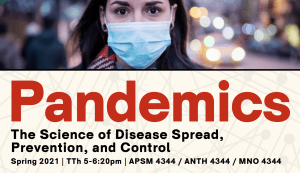Undergraduate students in a public health course at SMU propose diverse approaches and perspectives while discussing public health measures taken during the COVID-19 pandemic and its relation to limiting civil liberties.
Tag: COVID-19
COVID-19
Undergraduate students in a new public health course at SMU are honing their persuasive speaking abilities in a series of formal debates about ongoing public health issues.
Innovative research on meditation and mindfulness continues at SMU
In light of the era-defining COVID-19 pandemic, SMU epidemiologist Dr. Eric G. Bing has created a new undergraduate course focused solely on international diseases and how we can combat them. Pandemics! The Science of Disease Spread, Prevention, and Control (APSM/ANTH/MNO 4344), which kicks off in Spring 2021, will give SMU students the basic tools they need to understand the many factors that drive disease spread and how local and global communities can combat it.
[The coronavirus] doesn’t care about politics. It only understands its biology. If we don’t begin to think like the virus, people will die.
COVID-19 Mindfulness Meditation Study
Mental health is an important factor during and after a global pandemic.
At the largest Battle to Save Lives in the event’s six-year history, student proposals drew positive reviews from key SMU officials.
SMU’s Global Public Health course shows how the online class meeting format can be leveraged to radically expand the borders of the classroom.


